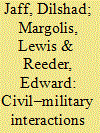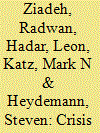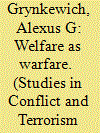| Srl | Item |
| 1 |
ID:
186531


|
|
|
|
|
| Summary/Abstract |
Humanitarian agencies and military forces are increasingly interacting on the ground during humanitarian crises. These evolving relationships are often complicated and bring forward many implementation challenges. This paper repurposes this debate by describing three non-conflict humanitarian case studies and using them to reflect on the problematic history and applicability of formal frameworks and guidelines. Recommendations to improve the structures and processes for implementation of relief strategies are offered. If the delivery of humanitarian assistance during non-conflict humanitarian crises is to be efficient, civil–military interactions should receive greater systematic attention.
|
|
|
|
|
|
|
|
|
|
|
|
|
|
|
|
| 2 |
ID:
188675


|
|
|
|
|
| Summary/Abstract |
Latin American foreign-policy elites defend the principle of non-intervention to shield their countries’ autonomy. By 2005, however, most Latin American foreign policy elites accepted the easing of limits on the use of force in international law. They supported the Responsibility to Protect (R2P), which regulates the use of force to protect populations from mass atrocities. The paper presents a comparison of the Brazilian, Chilean, and Mexican positions in the R2P debates to understand why they supported this norm. During the debates leading to the emergence of R2P, these elites questioned a central premise of liberal internationalism: the idea that great powers would restrain their use of military force as part of their commitment to a liberal international order (LIO). Using Republican international political theory, I argue that these Latin American foreign-policy elites viewed a restricted humanitarian-intervention norm as a new defence against great powers interfering in developing countries. Instead of trusting that great powers would restrain their actions, these elites advocated for a humanitarian-intervention norm that would prevent uncontrolled humanitarian interventions.
|
|
|
|
|
|
|
|
|
|
|
|
|
|
|
|
| 3 |
ID:
121495


|
|
|
| 4 |
ID:
102950


|
|
|
|
|
| Publication |
2011.
|
| Summary/Abstract |
Human rights originated as a political claim made by movements contesting state power. Recently, they have become the property of states: a juridical right that is for the state to give. I track this transformation through changes in responses to humanitarian crises. Humanitarian crises are seen to issue from two sorts of states-rogue states and failed states-both of whom violate, by commission or omission, the rights of their subjects. Given the failure of these states to protect the rights of their citizens, policymakers and rights advocates call for external intervention, or state-building. In understandings of state-building, human rights are for the state; or more correctly the state-being-built; to give, reversing the development of human rights from a set of political movements that protested unjust state power.
|
|
|
|
|
|
|
|
|
|
|
|
|
|
|
|
| 5 |
ID:
142039


|
|
|
|
|
| Summary/Abstract |
Over the past two decades, the United Nations Security Council has responded more strongly to some humanitarian crises than to others. This variation in Security Council action raises the important question of what factors motivate United Nations intervention. This article offers a configurational explanation of selective Security Council intervention that integrates explanatory variables from different theories of third-party intervention. These variables are tested through a comparison of 31 humanitarian crises (1991–2004) using fuzzy-set qualitative comparative analysis. The analysis shows that a large extent of human suffering and substantial previous involvement in a crisis by international institutions are the key explanatory conditions for coercive Security Council action, but only when combined with negative spillover effects to neighboring countries (path 1) or with low capabilities of the target state (path 2). These results are highly consistent and explain 85% of Security Council interventions after the end of the Cold War. The findings suggest that the Council’s response to humanitarian crises is not random, but follows specific patterns that are indicated by a limited number of causal paths.
|
|
|
|
|
|
|
|
|
|
|
|
|
|
|
|
| 6 |
ID:
118983


|
|
|
| 7 |
ID:
081347


|
|
|
|
|
| Publication |
2008.
|
| Summary/Abstract |
Several violent non-state groups also administer social services. Although earlier works stress the effects of social service provision on support and sympathy for violent groups, this article emphasizes a broader challenge. Namely, social welfare organizations threaten to rob the state of the legitimacy it derives through the social contract. Abolishing these organizations can cause humanitarian crises, radicalize populations, and erode domestic and international policy support. Ignoring them invites the continued erosion of state power. The way out of this dilemma is through a strategy of "displacement," whereby the state eradicates non-state social services while concurrently extending its own welfare capacity
|
|
|
|
|
|
|
|
|
|
|
|
|
|
|
|